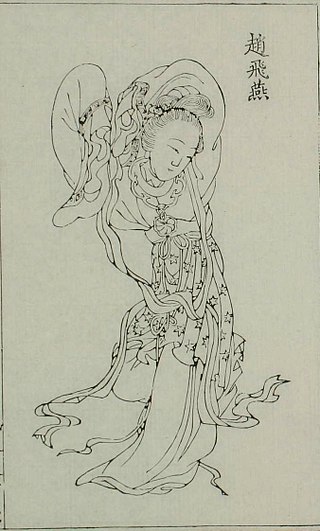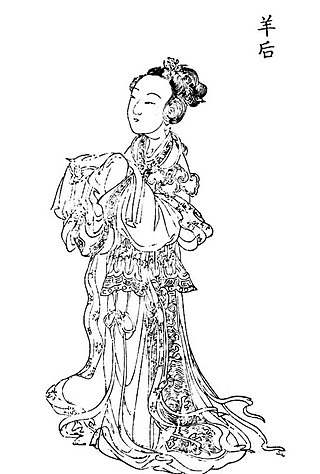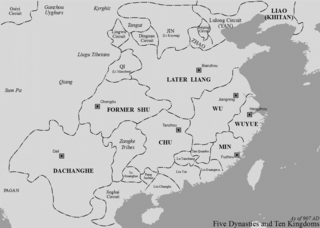
Wang Mang, courtesy name Jujun, officially known as the Shijianguo Emperor (始建國天帝), was the founder and the only emperor of the short-lived Chinese Xin dynasty. He was originally an official and consort kin of the Han dynasty and later seized the throne in 9 CE. The Han dynasty was restored after his overthrow, and his rule marked the separation between the Western Han dynasty and Eastern Han dynasty. Traditional Chinese historiography viewed Wang as a tyrant and usurper, while more recently, some historians have portrayed him as a visionary and selfless social reformer. During his reign, he abolished slavery and initiated a land redistribution program. Though a learned Confucian scholar who sought to implement the harmonious society he saw in the Chinese classics, his efforts ended in chaos.

The Xin dynasty, also known as Xin Mang in Chinese historiography, was a short-lived Chinese imperial dynasty which lasted from 9 to 23 AD, established by the Han dynasty consort kin Wang Mang, who usurped the throne of the Emperor Ping of Han and the infant "crown prince" Liu Ying. The Xin dynasty ruled for over a decade before it was overthrown by rebels. After Wang's death, the Han dynasty was restored by Liu Xiu, a distant descendant of the Emperor Jing of Han; therefore, the Xin dynasty is often considered an interregnum period of the Han dynasty, dividing it into the Western Han and the Eastern Han.

Emperor Cheng of Han, personal name Liu Ao, was an emperor of the Chinese Han dynasty ruling from 33 until 7 BC. He succeeded his father, Emperor Yuan. Under Emperor Cheng, the Han dynasty continued its growing disintegration as the emperor's maternal relatives from the Wang clan increased their grip on the levers of power and on governmental affairs as encouraged by the previous emperor. Corruption and greedy officials continued to plague the government and, as a result, rebellions broke out throughout the country. Emperor Cheng died childless after a reign of 26 years; both of his sons by concubines had died in infancy. One of them starved to death and another was suffocated in prison. The babies and their mothers were killed by the order of Emperor Cheng's favorite consort Zhao Hede, with the implied consent of the emperor. He was succeeded by his nephew, Emperor Ai, whose death was followed by Wang Mang's rise to power.

Emperor Ai of Han, personal name Liu Xin, was an emperor of China's Han dynasty. He ascended the throne when he was 20, having been made heir by his childless uncle Emperor Cheng, and he reigned from 7 to 1 BC.

The Gengshi Emperor, born Liu Xuan, was an emperor of the Han dynasty that had been restored following the downfall of Wang Mang's short-lived Xin dynasty. He was also known by his courtesy name Shenggong and as the King or Prince of Huaiyang, a posthumous title bestowed upon him by Emperor Guangwu of the Eastern Han. The Gengshi Emperor was viewed as a weak and incompetent ruler, who briefly ruled over an empire willing to let him rule over them, but was unable to keep that empire together. He was eventually deposed by the Red Eyebrows and strangled a few months after his defeat.

Emperor Guangwu of Han, born Liu Xiu (劉秀), courtesy name Wenshu (文叔), was a Chinese monarch. He served as an emperor of the Han dynasty by restoring the dynasty in AD 25, thus founding the Eastern Han dynasty. He ruled over parts of China at first since his dynasty was formed through rebellion against the short-lived Xin dynasty, and through suppression and conquest of regional warlords, the whole of China proper was consolidated by the time of his death in AD 57. During his reign, Taoism was made the official religion of China, and the Chinese folk religion began to decline.

Handan is a prefecture-level city located in the southwest of Hebei province, China. The southernmost prefecture-level city of the province, it borders Xingtai on the north, and the provinces of Shanxi on the west, Henan on the south and Shandong on the east. At the 2010 census, its population was 9,174,683 inhabitants whom 2,845,790 lived in the built-up area made of 5 urban districts. Yongnian District in Handan and Shahe City in Xingtai have largely formed into a single conurbation.

Zhao Kingdom or Zhao Principality was a kingdom or principality in early Imperial China, located in present-day North China.
Wang Zhengjun, officially Empress Xiaoyuan (孝元皇后), later and more commonly known as Grand Empress Dowager Wang, born in Yuancheng, was an empress during the Western Han dynasty of China, who played important roles during the reigns of five successive Han emperors and later led to the usurpation of the throne by her nephew Wang Mang. She is largely viewed sympathetically by historians as an unassuming and benevolent if overly doting woman who suffered much in her long life, who tried to influence the empire as well as she could, and tried to use her power for the benefit of the empire, and who was not a party to her nephew's machinations, but whose failure, leading to the downfall of the Western Han Dynasty, was her overdependence on her clan.

Zhao Feiyan, formally Empress Xiaocheng (孝成皇后), was a Chinese courtesan and empress. She was an empress during the Han dynasty. Her husband was Emperor Cheng. She was known in the collective consciousness of Chinese society more for her beauty than for the regal presence that she and her sister, the Consort Zhao Hede engaged in and exuded, but unlike most of the famous beauties in Chinese history, she was often vilified by her own sisters. She was often compared and contrasted with Yang Guifei, the concubine of Emperor Xuanzong of Tang, because she was known for her slender build while Yang was known for her full build. This led to the Chinese idiom huanfei yanshou, which describes the range of the types of beauties. Later, the idiom was also used as a figurative expression on literary styles that can be either verbose or sparse, but were equally effective.
Empress Wang (王皇后)(died January 21 CE), formally Empress Xiaomu was an empress during the Xin dynasty.
Guo Shengtong was an empress during the Eastern Han dynasty. She was the second wife and first empress of Emperor Guangwu, the founder of Eastern Han. She eventually lost her husband's favor and was deposed in 41 in favor of his first wife, Yin Lihua. However, both she and her family continued to be respected and honored even after she was deposed.

The Battle of Kunyang was fought during June and July in 23 AD, between the Lulin and Xin dynasty forces. The Lulin forces were led by Liu Xiu, who later became Emperor Guangwu of Han, while the far more numerous Xin were led by Wang Yi and Wang Xun (王尋). Wang Xun was killed during a foolhardy attack on Liu's force with a small contingent of his force, and the Lulin forces disrupted the remainder of the Xin army, forcing Wang Yi to retreat. This was the decisive battle that led to the fall of the Xin dynasty.

Yang Xianrong (羊獻容), posthumous name Empress Xianwen, was an empress—uniquely in the history of China, for two different dynastic empires and two different emperors. Her first husband was Emperor Hui of Jin, and her second husband was Liu Yao of Former Zhao. Also unique was that she was deposed four times and restored four times as empress of the Western Jin.
Zhu Zhen, often referred to in traditional histories as Emperor Mo of Later Liang and sometimes by his princely title Prince of Jun (均王), né Zhu Youzhen (朱友貞), known as Zhu Huang (朱鍠) from 913 to 915, was the third and last emperor of China's Later Liang dynasty during the Five Dynasties and Ten Kingdoms period, ruling from 913 to 923. He ordered his general Huangfu Lin (皇甫麟) to kill him in 923 when Emperor Zhuangzong of Later Tang, the emperor of Later Liang's enemy Later Tang to the north, was on the cusp of capturing the Later Liang capital Daliang. His death marked the end of Later Liang, which was to be the longest among the Five Dynasties. Despite his ten-year reign being the longest of all the Five Dynasties emperors sources on his era are relatively scarce, as many Later Liang records were destroyed following the Later Tang conquest of the Later Liang.

Wang Chuzhi (862–922), courtesy name Yunming, formally the Prince of Beiping, was a warlord late in the Chinese Tang dynasty and early in the subsequent Five Dynasties and Ten Kingdoms period, who ruled Yiwu Circuit as its military governor (Jiedushi) from 900 and as its de jure sovereign from 910 to 921, when he was overthrown by his adoptive son Wang Du.
Yang Shihou (楊師厚), formally the Prince of Ye (鄴王), was a major general of the Chinese Five Dynasties and Ten Kingdoms period state Later Liang, serving as the main obstacle to the expansion of Later Liang's archenemy Jin during latter parts of the reign of Emperor Taizu and the early parts of the reign of Emperor Taizu's son Zhu Zhen.
Zhao Dejun, né Zhao Xingshi (趙行實), known as Li Shaobin (李紹斌) during the reign of Li Cunxu, formally the Prince of Beiping (北平王), was a general of the Chinese Five Dynasties and Ten Kingdoms period state Later Tang. Toward the end of Later Tang, he was ordered by Later Tang's final emperor Li Congke to combat Li Congke's brother-in-law, Shi Jingtang, who had rebelled against Li Congke's reign and established his own Later Jin, as well as Shi's Khitan allies, led by Khitan's Emperor Taizong. However, after failed negotiations in which Zhao himself tried to get Emperor Taizong's support to overthrow Later Tang, the joint Khitan/Later Jin forces defeated him, forcing him to surrender to Khitan. He died in captivity.

Singing All Along is a 2016 Chinese television series produced by Ruby Lin, starring Lin and Yuan Hong. Set in 1st-century imperial China, the drama is based on Li Xin's (李歆) 2007–2009 romantic novel series Xiuli Jiangshan (秀丽江山) and focuses on the relationship between Liu Xiu, a peasant-turned-Eastern Han dynasty founder, and Yin Lihua, the love of his life. Although the original novel involved time travel, the television series does not contain those parts.
Chen Xi was a Chinese rebel leader against the first Han emperor Liu Bang.












